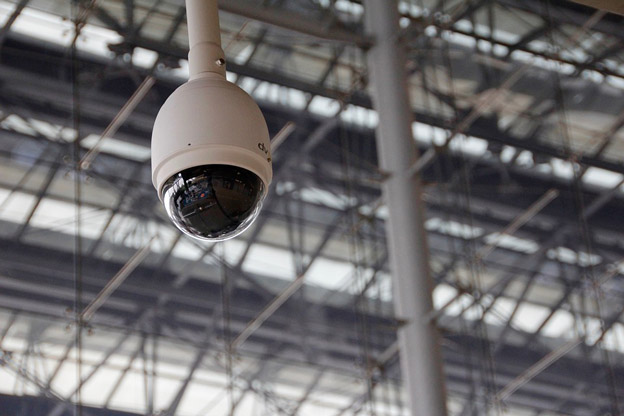Does Nj Prohibit Cameras From Pointing Into Other People's Houses And Backyards

Surveillance cameras are everywhere around u.s.a., in stores, on the streets, and even in public transportation. But the question is, how far can surveillance go? Where is it legal to put surveillance cameras? Are in that location specific places that cameras are not allowed? There are a few things you may non know nigh surveillance camera laws in the U.Due south.
If you own property or a business, you have the correct to install security cameras on your property with a few restrictions. Here are the security camera laws you should know about.
General U.Southward. Laws Regarding Video Surveillance
The general rule of thumb regarding video surveillance beyond the U.S. is that you're allowed to record surveillance video in public and so long as in that location's no reasonable expectation of privacy. Places where an individual has a reasonable expectation of complete privacy include:
- Bathrooms
- Shower areas
- Hotel rooms
- Bedrooms
- Locker rooms
- Changing rooms
Information technology'southward important to note that every state has its ain laws regarding the use and placement of security cameras, audio recording, and privacy matters, so check with all relevant jurisdictions to be sure. So long as you're following these security camera laws, you can utilise video cameras for monitoring your abode or business organisation belongings. Earlier you go alee with any installation plans, go familiar with local, state, county, and federal laws regarding surveillance cameras.
It's besides illegal in the U.S. to record surveillance video or audio with the sole purpose of malicious intent or bribery.
Understanding Sound vs Video Surveillance Laws
The law oft treats video and audio recording differently. More often than not, it's legal to record surveillance video using a hidden camera in your business organization or holding without the consent of those you're recording.
However, the recording of sound is restricted by the Federal Wiretap Human action, a law that imposes civil and criminal liabilities for intentionally recording communications. The Electronic Communications Privacy Act of 1986 provides an exception to this for job-related conversations for employers, non employees.
There are additional restrictions to audio recording in virtually every country. For a complete breakdown, we recommend this reference prepared by Matthiesen, Wickert & Lehrer, Due south.C.
Business Security Photographic camera Laws
Businesses accept an obligation to protect their personnel and assets, so information technology'southward important that they install professional-class security monitoring systems for on-premise security and safety. Determining whether video surveillance at work is legal or illegal depends on state constabulary as well as what images are beingness captured. Here's what you should know:
- Workplace Privacy Laws
In areas where in that location'southward a reasonable expectation of privacy, conducting video and audio surveillance without any class of notice or explicit permission is illegal. Such areas include elevators, bathrooms, hotel rooms, locker rooms, and dressing rooms. Even with notification of surveillance in privacy-protected areas, employers should not misuse the data they collect using the cameras, co-ordinate to business security camera laws. It's all-time to seek legal advice from your employment attorney or state section of labor. Recording audio is also prohibited past federal wiretapping laws unless y'all've informed employees.
- Having a Legitimate Business Reason for Surveillance
When information technology comes to using security cameras to monitor employees, employers must have a legitimate concern reason to do so. State privacy laws should guide y'all on specific limitations and allowances regarding video and audio surveillance. Of course, in public view areas such equally money transaction points and retail store shelves where appurtenances are sold, having video surveillance will help you prevent theft and monitor how employees conduct business concern.
Residential Surveillance Photographic camera Laws
For many homeowners, a video surveillance system is an integral part of their home security strategy. It offers deterrence against would-be burglars, abusive or irresponsible caretakers, babysitters, and nannies. With a complete system in identify, you can hands obtain evidence for whatsoever criminal activities. Withal, deciding whether, where and how to mount your security cameras comes with some legalities. Here are some of the residential security camera laws yous should know:
- Monitoring Your Neighbor'southward Property
No one is legally entitled to look privacy when they're in clear and open view of the general public. This applies in areas such equally the front yard that's in evidently view. However, directing your security cameras inside your neighbor'southward firm or in a partially or totally hidden backyard is a crime. If you exercise this, yous could be exposing yourself to criminal prosecution. Directing cameras to a neighbour's belongings without their consent may cause some trouble, and then be aware of that.
- Video Surveillance Inside Your Dwelling house
You take more than liberty when information technology comes to installing cameras where you want inside your home, simply you don't necessarily have the right to monitor or record everything within your domicile. For instance, residential security camera laws stipulate that people working at your home or guests expect privacy in some areas such every bit the bathroom. Besides, if you lot take a guest business firm or room and have cameras monitoring them, that could violate their privacy. However, for any other place that you and your family want to secure within your home, you can install security cameras.
- Recording Conversations
Apart from where and what homeowners can record, there'south the question of recording sound if the surveillance system has the capability to record audio. Federal and state wiretap laws restrict anyone from monitoring and recording conversations even in your home. However, in most cases, with the consent of at least one person, it's not illegal. In some states, all parties being recorded must consent. That's why understanding your state'south surveillance camera laws regarding video and audio recordings is and so important.
- Consult Your Homeowner's Association
For those living in residential subdivisions or condominiums, it's important to consult your homeowner'due south association security camera laws so you can understand video surveillance rules. To avoid the risk of liability, near of these associations will not let yous to direct cameras to other units or homes.
The Bottom Line

Understanding both federal and country laws volition assistance you lot ensure that you're using your security system in the right mode without infringing on other people's rights. Investing in quality security camera systems is also disquisitional if y'all want to make the most out of your monitoring efforts.
CCTV Security Pros brings you commercial-grade security camera systems designed for business and home surveillance. Whether you want a unmarried dome camera with infrared night vision for indoor surveillance or a consummate multi-camera IP system for business surveillance, we take what you demand.
We tin can assist you customize your security arrangement and understand security camera laws so you tin can utilise your cameras with peace of mind. Contact us now.
Source: https://www.cctvsecuritypros.com/blog/surveillance-camera-laws-for-business-property-owners/
Posted by: huertareplads.blogspot.com


0 Response to "Does Nj Prohibit Cameras From Pointing Into Other People's Houses And Backyards"
Post a Comment